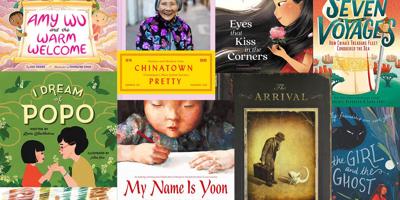The first Asian-themed book drive for Metro Nashville Public Schools and Williamson County Schools is currently underway — and it’s coming at an important time for Nashville’s Asian American and Pacific Islander community amid a steady increase in anti-Asian hate nationwide.
According to watchdog organization Stop AAPI Hate, nearly 11,000 hate incidents against Asian Americans and Pacific Islanders were reported in the U.S. between March 2020 and December 2021. Anti-Asian hate crimes also increased by 339 percent nationwide last year, according to a study published by the Center for the Study of Hate and Extremism.
“Since COVID, you can see that there’s been anti-Asian sentiment all over the country, even sometimes in Tennessee,” says Christine Lai, the president of the Greater Nashville Chinese Association. Lai says people in her community have been harassed in supermarkets and other public spaces. “So GNCA kind of sat down and asked, ‘What can we do about it?’ ”
AAPI-centered organizations like GNCA, API Middle Tennessee and the Nashville Chinese School have joined forces in an effort to strengthen their communities, uplift each other’s voices and unpack their cultural identities. These organizations have recently moved to more action within the past year, citing the rise in anti-Asian hate and the Atlanta-area spa shootings that claimed the lives of six Asian women in March 2021.
“We considered that one of the reasons why there’s anti-Asian sentiment here is that some people don’t understand Asian culture,” says Lai.*
“With reading, you can build a connection and help everybody with Asian heritage in schools get a sense of belonging," says Irene Moser, principal of the Nashville Chinese School. “When you see a book that represents your culture in the library, everybody can check it out to read.”
The drive aims to put books on school library shelves that capture the Asian American experience, convey important Asian cultural traditions and spotlight authors of Asian descent. Out of the 29 titles on the current donation book list, 14 are either unavailable or have very few copies in MNPS libraries.
The initial fundraising period began on March 9, and GNCA is still accepting donations via its GoFundMe campaign throughout April. The goal is to raise $11,000, which will allow them to purchase and donate approximately 600 books to MNPS and Williamson County school libraries.
This book drive, created in partnership with other organizations, is just one way GNCA is proactively working toward empowering the AAPI community. “Obviously, we can invite the police to come in to talk about how to protect ourselves,” says Lai. “But that is very passive — we want to be active.”
In Nashville, Asian Americans make up nearly 4 percent of the city. API Middle Tennessee executive director Joseph Gutierrez says AAPI students still deserve to be seen despite being a smaller part of the population.
“Representation matters,” says Gutierrez. “When there are not enough Asian students to even say they exist, their end sizes are so small that they’re statistically irrelevant. But those students need to be seen, and they need to see themselves in the school. So I think books are a great way for cultural exchange and for students to see themselves being main characters in their own lives.”
For these three organizations, the book drive is only the first step in an initiative they hope will expand throughout Middle Tennessee. “This drive is very meaningful because it’s a sustainable action we can do to further help our next generation, even my next generation, to keep their heritage,” says Prince Huang, outreach committee lead for GNCA. “We hope this will be a starting point to influence other regions of Tennessee and outside states to do the same.”
Books will be delivered to participating schools in May, which is Asian American and Pacific Islander Heritage Month. People who wish to donate new or gently used books can drop them off at the Natchez Trace Church of Christ on April 23 and April 30 from 9 a.m. to 12:15 p.m.
*This article originally misattributed this quote to Irene Moser. It has since been corrected. We regret the error.





